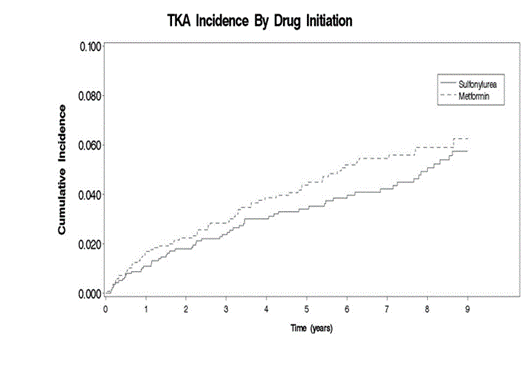Session Information
Date: Tuesday, November 7, 2017
Title: Epidemiology and Public Health Poster III: Rheumatic Disease Risk and Outcomes
Session Type: ACR Poster Session C
Session Time: 9:00AM-11:00AM
Background/Purpose: Metformin is the most widely used first-line therapy for type 2 diabetes. Studies have suggested that metformin reduces inflammation and lowers levels of PGE2, IL-1β, IL-6 and TNFα in macrophages through its effects on AMPK and the NF-κB pathway. Further, by activating AMPK, metformin may suppress chondrocyte matrix catabolic responses to inflammatory cytokines. However, few studies have assessed the effect of metformin on the risk of end-stage knee OA.
Methods: We carried out 2 studies to examine the effect of metformin on the risk of total knee arthroplasty (TKA). Subjects, drawn from The Health Improvement Network (THIN) in the United Kingdom, were between 40-90 years old (year 2000-2014) and had clinical OA with no history of renal disease or TKA. In the first cohort study, each metformin initiator was propensity-score matched to a sulfonylurea initiator within 12-month accrual block. Subjects were followed to the date of TKA, disenrollment from THIN, or 12/31/2014. We plotted cumulative risk of TKA for each cohort accounting for competing risk and examined the relation of metformin to the risk of TKA using Cox proportional hazards model. In the second case-control study conducted among metformin initiators only, we randomly selected up-to four controls from a risk set matched to each TKA case by age, sex, and year of metformin initiation. We estimated the odds ratio (OR) of TKA according to recency of use (i.e., remote: stopped metformin prescription ≥12 months prior to TKA; recent: stopped metformin prescription between >15 days -<12 months prior to TKA; and current use: metformin use within 15 days prior to TKA) and duration of use among the current users (i.e., <1 year, 1-<2 years, 2-<4 years, and 4+ years) using conditional logistic regression model adjusting for BMI, NSAIDs use, OA duration, GP visits prior to metformin use, Townsend deprivation score, comorbidities and other oral antidiabetics.
Results: The baseline characteristics were well balanced in the two comparison cohorts (n=1,387 in each cohort) in the first study. Over 15,871 person-years of follow-up, 75 TKA cases (incidence rate: 9.04/1000 person-years) in the metformin cohort and 63 (incidence rate: 8.31/1000 person-years) in the sulfonylureas cohort had TKA. No difference in the risk of TKA was observed between the cohorts (p> 0.65, Figure 1). Compared with sulfonylurea initiators the hazard ratio of TKA for metformin initiators was 1.08 (95% CI: 0.77-1.51). The ORs of TKA for recent and current use of metformin were 0.88 (95% CI: 0.61-1.27) and 1.12 (95% CI: 0.84-1.49), respectively, compared with remote use. There was no dose–response relationship between duration of metformin: ORs of TKA were 1.04, 1.14, 1.22 and 1.05 for use <1 year, 1-<2 years, 2-4 years and 4+ years, respectively, compared with remote use.
Conclusion: Our findings suggest that in persons with OA, metformin use does not lower the risk for TKA.
To cite this abstract in AMA style:
Zhang Y, Peloquin C, Lu N, Neogi T, Felson DT. Effect of Initiating Metformin Vs. Sulfonylureas on the Risk of Total Knee Arthroplasty [abstract]. Arthritis Rheumatol. 2017; 69 (suppl 10). https://acrabstracts.org/abstract/effect-of-initiating-metformin-vs-sulfonylureas-on-the-risk-of-total-knee-arthroplasty/. Accessed .« Back to 2017 ACR/ARHP Annual Meeting
ACR Meeting Abstracts - https://acrabstracts.org/abstract/effect-of-initiating-metformin-vs-sulfonylureas-on-the-risk-of-total-knee-arthroplasty/

